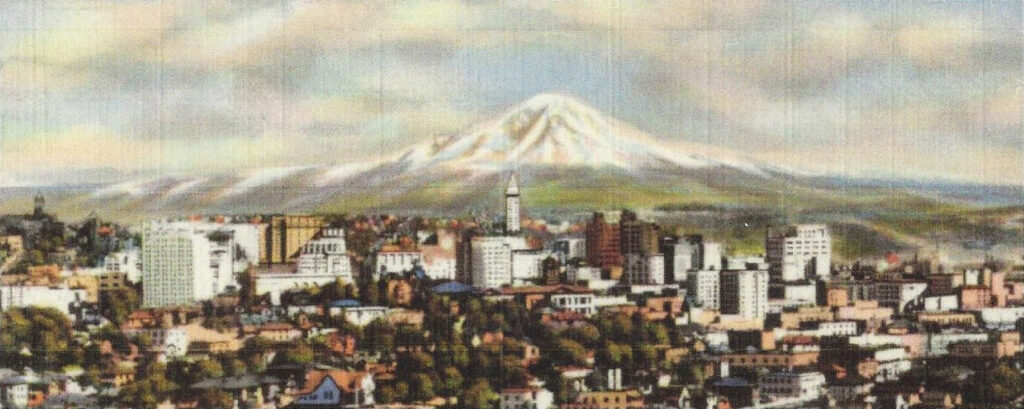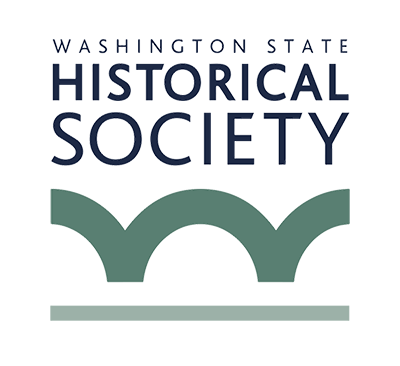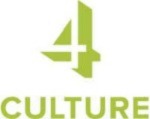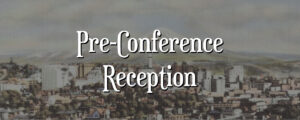
Download a printable version of the conference schedule.
THIRTY FIRST REGIONAL HISTORY CONFERENCE
Sponsored by the Pacific Northwest Historians Guild
Revisit and Reimagine
Pacific Northwest Histories
SEPTEMBER 23, 2023
Downtown Seattle Public Library
ORDER A BOX LUNCH BY 09/19 NOON
September 22, 7-9pm
Mountaineers Seattle Program Center
$10 Guild members / $20 others
RECEPTION DETAILS
CONFERENCE SCHEDULE
8:15 – 9:00: CONFERENCE REGISTRATION
9:00-9:10:00: Welcome and Keynote Address by Feliks Banel
“Whidbey Island Man,” “University of Southern Crossroads,” and the “Friend of the Family”: Exploring Pacific Northwest Regional Identity through Vernacular History. Through place-names that don’t appear on any map or app, nicknames for local areas that might qualify as geographic insults, and indelible homegrown ad campaigns and commercial slogans that remain front-of-mind for decades, Feliks Banel revisits and reimagines the mythology and pop culture of Pacific Northwest history and regional identity at street level.
SESSION 1 – 10:15-11:50
UNCONVENTIONAL WOMEN
We Are All Women Here – Starlyn Stout
An exploration of gender and citizenship through the events of Rosencrantz v. Territory (1884) and its reversal three years later in Harland v. Territory. The trials represent the convergence of three women, each representing very different archetypes of womanhood in the late 19th century: the affluent housewife, single female attorney, and madam of a house of ill repute.
POST CONFERENCE FOLLOW-UP: www.historianne.com
Revisiting Phoebe Judson: Unveiling the Pioneer Woman’s Perspective on Indigenous Relations in the Pacific Northwest – Hayley Kirk
A look at the life and unique perspective of Phoebe Judson, a pioneering woman in the Pacific Northwest during the nineteenth century, renowned as the first non-Indigenous woman to permanently settle in the Lynden region of Washington State. Her memoir, A Pioneer’s Search for an Ideal Home, provides valuable insights into her experiences on the Oregon Trail and her interactions with Indigenous communities.
Remembering Ida Lou Anderson on the WSU Pullman Campus – Trevor James Bond, Phil Gruen, Linda Bathgate.
An illustrated presentation on the life of a remarkable Washington State College faculty member and graduate of Colfax High School who taught at the institution from 1926 to 1939 and trained and inspired a generation of broadcasters including Edward R. Murrow.
ACTIVISM
Worker Ecological and Class Consciousness in the Construction of the Trans-Alaskan Pipeline System – Matt McIntosh
A look at the history of workers involved in the construction and operation of the Trans-Alaskan Pipeline System and how they were integral in shaping American energy, environmental, and economic policy amidst significant sociopolitical and ecological turbulence.
The Fight for Fair Employment: Black Civil Rights Activism in Washington State and Alaska, 1948–1964 – Ross Coen
An examination of African American civil rights activism in Washington and Alaska, focusing on employment protections and an institutional approach to enshrine the protections in state and local law.
Fighting Seattle’s “Obeisance To Police”: Police Violence and Community Voices in The Seattle Times and Seattle Post-Intelligencer, 1960-1970 – Marshall Bender
An analysis of how civil rights activist efforts after the deaths of several Black men at the hands of the Seattle Police Department from 1960-1970 forced changes in the newspaper coverage of police violence in Seattle’s two major news organizations
HISTORY ON THE WATERWAY
The River That Made Seattle: A Natural and Human History of the Duwamish – BJ Cummings with panel discussion
A presentation by the author of The River that Made Seattle: A Human and Natural History of the Duwamish on the role of the Duwamish River and its indigenous and immigrant communities in the founding of Seattle and a panel discussion with representatives of those groups.
Seattle’s “Lost” Cemetery – Cari Simson & Elke Hautala
The challenges and mysteries of what happened to the people buried at the Duwamish Cemetery (aka Seattle’s Potter’s Field) when it was erased in 1912 in preparation for the dredging and straightening of the Duwamish River.
LUNCH AND WORKSHOPS – 12-1:00
“Doing History”
Treasure Maps – Ryan Bennett
See how secrets of history can be uncovered using the Caltopo app’s Historical Maps – including vanished islands and town sites as well as altered boundaries – and how a map app can become an invaluable research tool.
Postcards from the Park – Teresa Andre
Learn how the lives and thoughts of everyday people communicating in vintage postcards provide unique opportunities to help us understand more about societal issues, linguistic and cultural shifts, changes in landscapes and more.
POST CONFERENCE FOLLOW-UP: Biography & Reference List
Poster Exhibit
Take time to meet Jennafer Prongos and discuss her poster exhibit, Uncovering the Hidden Assets of Infrastructure Records.
SESSION 2 – 1:15-2:45
UNCOVERING NEW HISTORIES
Norwegians Bring Ski Jumping to the Northwest to Showcase Their National Identity – John W. Lundin
A look at the unique contributions of Norwegian immigrants who brought to the Pacific Northwest their passion for ski jumping and established the region as a major venue for that international sport.
Rewriting School Histories – Melinda Lamantia & Meaghan Kahlo
Join Seattle Public Schools Records and Archives Department staff as they discuss the herculean effort to update a school histories book, Building for Learning Seattle School Histories, 1862-2022.
REI Co-op: Was it About the Ice Axe or Creating Access? – Will Dunn
REI’s corporate archivist will tell about launching the organization’s first archive in 2022 after digging into REI’s founding as a co-op in 1938 and retracing the arc from those roots to the modern day.
ADDRESSING CONTROVERSIAL HISTORIES
Public History – In the Trenches – Richard Heisler and Trevor James Bond
A conversation on the challenges of presenting local/regional/national history that may be perceived as difficult or controversial. How does one navigate such challenges in presenting history to a resistant or opinionated public? What lessons have been learned that have changed the way you present history?
Federal Entities as Community Archives: Northwest National Parks Reframing Regional History – Rebecca Gordon
Trace the history of Bellingham’s restricted district, in which commercial sex was officially sanctioned and regulated, from its boom years of the late 19th century through sustained and ultimately successful attacks by civic, religious, and political leaders to drive vice out of public view.
POST CONFERENCE FOLLOW-UP:
“old racist” Whitman Mission film
“new” more Cayuse-centered film
Making and Breaking Whatcom’s Restricted District, 1890 to 1912 – Josh Cerretti
Tracing the history of the Bellingham’s restricted district, in which commercial sex was officially sanctioned and regulated, from its boom years of the late 19th century through
sustained and ultimately successful attacks by civic, religious, and political leaders to drive vice out of public view.
LOSING AND PRESERVING LOCAL HISTORY
The Cettolin House in West Seattle – David Peterson
Learn about the Cettolin House, a unique vernacular structure in Seattle, designed and constructed by Italian immigrant Fausto Cettolin, whose design references forms and imagery from his youth in Italy. The property broadens our understanding of Seattle’s Italian community, which has historically been relatively small compared to other immigrant groups and has few remaining buildings associated with it.
Disappearing Acts. Things We’ve Lost Recently and Others We’re on the Verge of Losing – Bill Kossen and Clay Eals
Learn though a series of illustrated stories about some favorite things that have disappeared from view in our region in the 21st Century.
POST CONFERENCE FOLLOW-UP: “Seattle on the Puget Sound” video
History and Preservation of Neon Signs – Susan Boyle
Many of Seattle’s iconic neon signs are relics of the past or out of sight in a museum, but they’re not forgotten. Learn about neon signage history, the preservation of Seattle’s Elephant Car Wash sign, and discover the life and creative work of Beatrice Haverfield, the original designer of that sign and many other neon creations in the northwest, including the Rainier “R,” Ivar’s Acres of Clams, Chubby & Tubby, and Dick’s Drive-In.
SESSION 3: PANEL DISCUSSIONS 3:00-4:30
Uncovering the Northwest’s Latino/e Activism through Radio, Voting Rights, and Placemaking – Dr. Erasmo Gamboa, Dr. Josue Q. Estrada, and Victor Ochoa
This panel discussion focuses on the power of Spanish radio, particularly the role of Herminia Mendez, and how she empowered Washington’s communities after WWII; provides an important backstory to Washington’s Voting Rights Act, especially the long activism by Latinos to win voting rights; and explores the intricate place-making process by Mexican Americans from southern Texas (Tejanos) to create a sense of place and belonging in Independence, Oregon.
Turn-of-the-Century Military Reform in the Pacific Northwest – Megan Churchwell (Lead panelist), Bill Woodward, and James Perrin.
The Pacific Northwest played a central role in military reform and naval development at the beginning of the 20th century. The country’s growing involvement in the Pacific brought attention to Puget Sound, finding in Washington’s ports, railways and terrain a logical gateway for sending both land and naval forces abroad. This panel will explore the reform and development that followed, tracing the interaction among national movements, regional institutions and local economies.
Indigenous Voices and the Puget Sound Treaty Wars Panel – Jennifer Ott, Elizabeth Rudrud, Jim Lauderdale, and Warren King George
A panel of Native tribal representatives and staff members from the Fort Nisqually Living History Museum and HistoryLink will talk about a program created in 2021 on the Puget Sound Treaty Wars, how that program subsequently evolved, what has been learned in the process and what the participants hope to do next.
POST CONFERENCE FOLLOW-UP:
Fort From Home: Puget Sound Treaty War Panel
Indigenous Voices podcast
WRAP-UP: 4:40-5:00 – MICROSOFT AUDITORIUM
Don’t miss checking out the display of books by Conference presenters and speakers at past Guild membership meetings.
At 4Culture’s table you can learn about the cultural funding agency for King County, Washington, whose team of grant-makers, cultural advocates, advisory committees, and volunteer peer review panelists support a diverse array of cultural endeavors all over the county (including this conference) through grants in the areas of arts, heritage, historic preservation, and public art.
This Conference and the Friday evening social are sponsored by the Pacific Northwest Historians Guild. The conference is hosted by the Seattle Public Library and additional funding support has been provided by the Washington State Historical Society and 4Culture.
 .
.  .
. 
Questions? Contact us at pacificnwhistoriansguild@gmail.com

